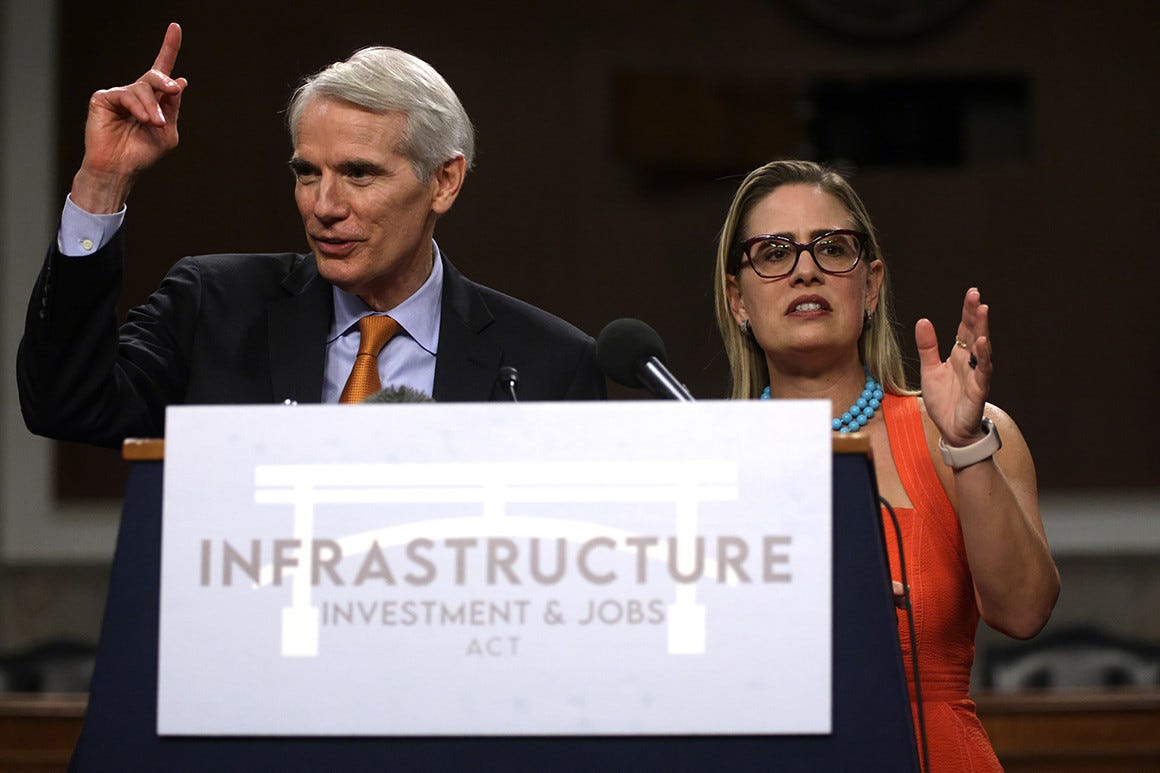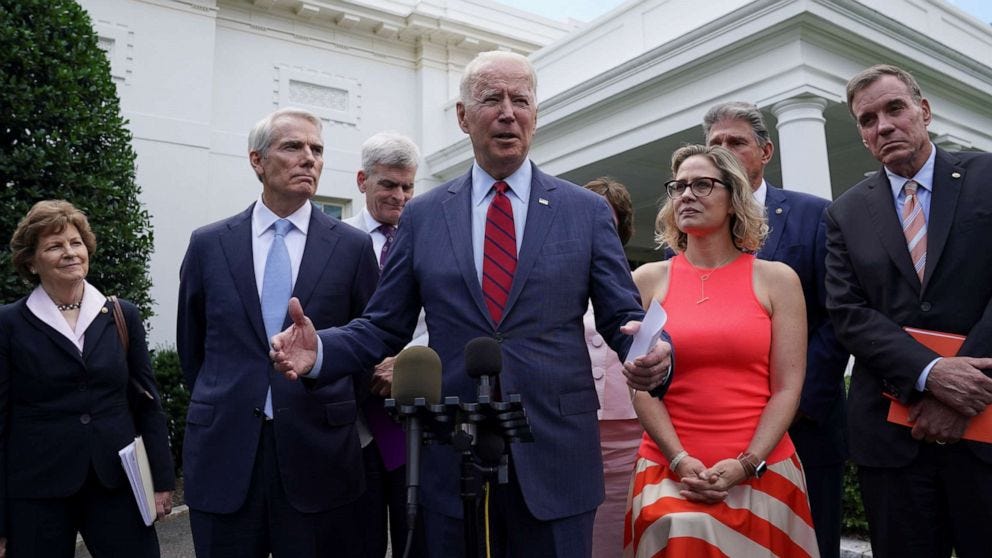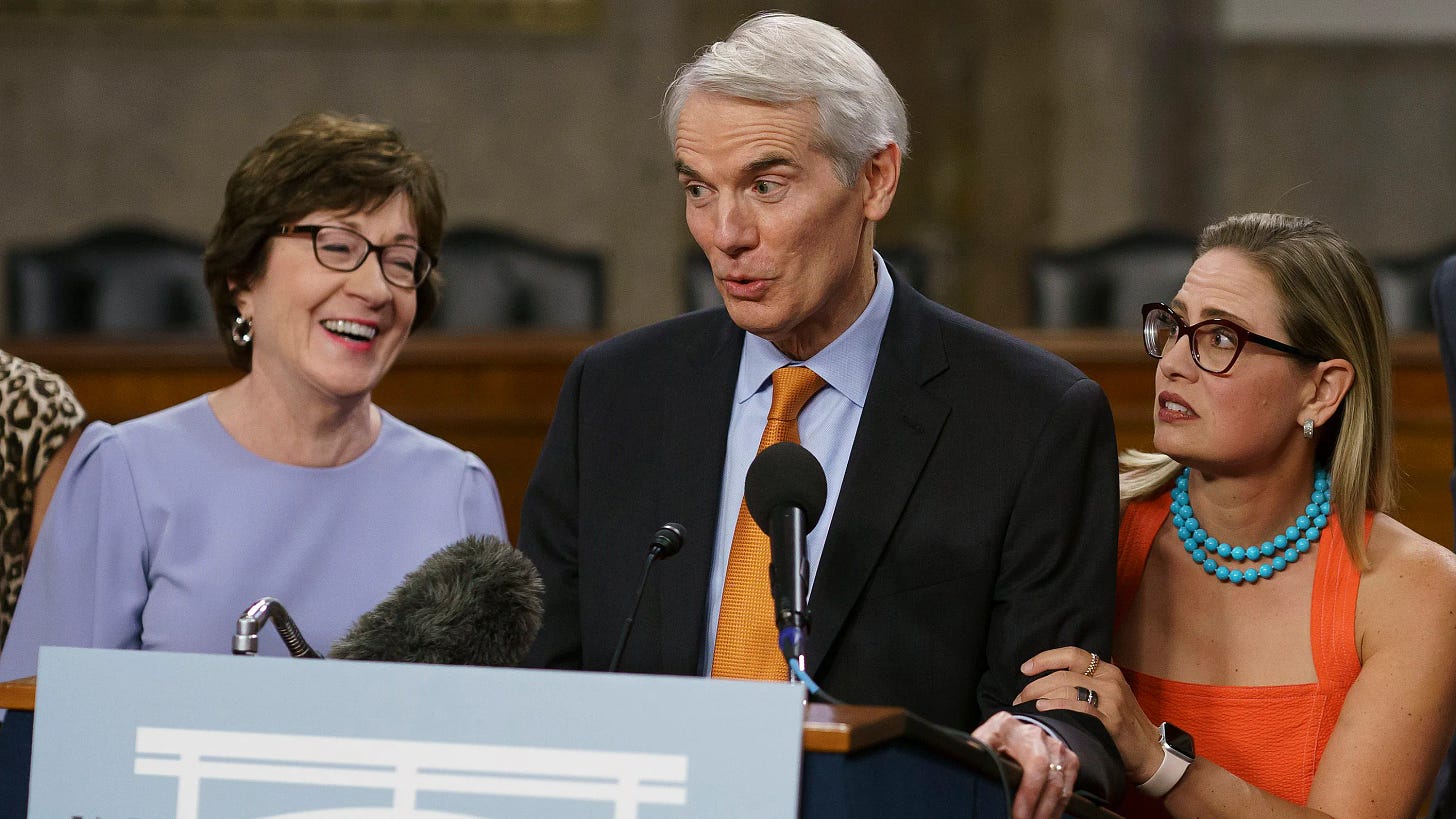
In a recently leaked email from dark money group No Labels, director Margaret White reminds her donors that the critical reconciliation bill, backed by Congressional Democrats, can still be killed, while she praises Senator Kyrsten Sinema (D-AZ) for her “heroic efforts” in the task.
According to the message that was reviewed by The Intercept, the dark money group remains optimistic in the plan to pull the bipartisan infrastructure bill away from the larger reconciliation package. The No Labels Executive Director also apparently expresses the possibility of outright killing the bigger bill put forward by Democrats, that makes up the bulk of the Biden agenda.
“It is now clear that the reconciliation package will be delinked in time from the infrastructure bill and will be less than $3.5 trillion (if it passes at all), in theory making support from House Republicans for the infrastructure bill more likely,” the email reads.
The email also allegedly praises Arizona Democratic Sen. Kyrsten Sinema for her relentless fight to destroy the infrastructure bill on their behalf. Liberal non-profit group Accountable.US has compiled a detailed report of donations to Sinema from organizations like the US Chamber of Commerce, PhRMA, and various other groups who appear to be actively working against the reconciliation package.

Overall, the report explains that Sinema has taken at least $923,065 from these industry groups and individual corporations, who are financially backing the charge against the Build Back Better agenda and its $3.5 trillion in funding for critical safety net programs in the US.
The report centers on five interest groups: the US Chamber of Commerce, the Business Roundtable, the RATE Coalition, the National Association of Manufacturers, and PhRMA.
“Super-rich corporations have given Senator Sinema nearly a million reasons to vote against making them pay their fair share in taxes,” Kyle Herrig, president of Accountable.US, said in a statement. “Make no mistake, if she sides with her wealthy donors and kills popular investments to jump-start the economy, everyday families—including across Arizona—will pay the price.”

The reconciliation package includes funding for critical issues like climate change, child care, elder care, and Medicaid/Medicare expansion. But major donors like those listed above, oppose the significant tax hikes to corporations that would offset the costs of the programs contained within the reconciliation. The House Ways and Means Committee approved $2.9 trillion in new taxes on the rich over the next decade, and those who stand to pay the price have been lobbying hard to make sure they are not footing the bill.
Progressives have insisted that both packages should go together so that centrists like Sinema and Manchin don’t take the win on the bipartisan bill and then kill the reconciliation bill, which is a much more expansive piece of legislation that includes the bulk of reform encapsulated in Biden’s agenda. Likewise, centrists argue that progressive fears of a betrayal like this are unfounded because moderates also support a version of the Biden agenda and also want to approve the bipartisan infrastructure bill as quickly as possible.
Emails like the one from No Limits are working to dispel the strength in centrist arguments because they appear to be celebrating what their large amounts of dark money funding is actually doing: attempting to kill reconciliation. Another factor includes the increase in dark money operations like these since the Supreme Court used a ruling in Citizens United to open the dark money floodgates in 2010.

“Dark money” can be an elusive term, but it ultimately refers to money that is spent to influence political outcomes where the source of the money is not disclosed. This process of using dark money to influence elections typically happens in two ways. First, politically active groups utilize a nonprofit 501(c)(4) status, which does not require them to disclose donors, and they also keep their backers’ identities a secret.
Since the Citizens United v. FEC Supreme Court ruling that gave rise to politically active nonprofits, like those who appear to be funding Sinema, groups have spent roughly $1 billion on methods meant to influence voters, mainly television and online ads and mailers. By concealing the sources of the covert funding that pays for these legal political “hit-jobs,” the electorate is bombarded with misleading political messaging that protects the true motives of corporations and the wealthy who are willing to pay for influence.
While groups on all sides are guilty of utilizing the tactics supported by the Citizens United ruling, dark money is typically used to play defense by Democrats in the ongoing barrage of political attack campaigns waged by the Republican Party. It’s also important to note that while Democrats are using dark money, the majority are doing so to ultimately get rid of it.
The ongoing struggle to pass infrastructure and the reconciliation bill, with a majority of votes in Congress and overwhelming public support, is proof that dark money is still pulling some significant strings at the cost of the American people. By accepting funding from these groups and pushing back on the passage of this essential legislation like infrastructure, Senator Sinema’s motives have justifiably come into question.
The fact that Sinema has worked to aid a Republican corporate agenda so far, and profited from influential money groups like No Limits, means that we now have an even larger problem within the controversial issue of dark money. Both Sinema and Manchin have proven a frightening point: having a “D” after your name in politics is not an indicator of intention and any member of Congress can be up for sale, even within the Democratic Party.
Amee Vanderpool writes the SHERO Newsletter and is an attorney, published author, contributor to newspapers and magazines, and analyst for BBC radio. She can be reached at avanderpool@gmail.com or follow her on Twitter @girlsreallyrule.
Paid subscriptions and one-time tributes embedded in each article, allow me to keep publishing critical and informative work like this, that is often made available to the public — thank you. If you like this piece and you want to further support independent journalism, you can forward this article to others, get a paid subscription or gift subscription or donate once, as much as you like today.





She and Manchin hold an insane and outsized amount of power in the Senate, but the scarier thing is what will happen if/when the Republicans retake the Senate in 2022.
Excellent - thank you for diving deeper into what is really going on here. Recently I read a piece on Manchin’s “blind” trust that his son runs involved with the energy industry and again one must say, personal greed over the greater good flourishes in congress.